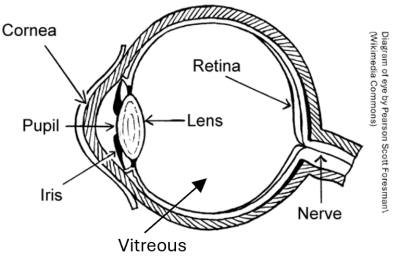About endophthalmitis
Endophthalmitis is severe inflammation of the tissues inside the eye. The inflammation is found throughout the entire eyeball.
Endophthalmitis can cause some loss of vision, but complete blindness (where one cannot see any light) is rare if the condition is treated early and appropriately. If left untreated, endophthalmitis can cause permanent loss of vision.
Causes
The most common cause is a serious eye infection.
The source of the infection can be introduced into the eye in 2 ways:
- from a recent eye operation or injection into the eye
- due to a spread of infection from elsewhere in the body (this is less common).
Symptoms
Symptoms include the following:
- eye pain
- redness
- sensitivity to light
- sudden reduced vision (especially 24 to 72 hours following an eye operation or injection).
If you experience sudden reduced vision
Seek immediate medical attention at your nearest eye casualty centre (see Urgent help section below).
Treatment
Treatment involves the following 2-step procedure which we perform at the Kingston Hospital Royal Eye Unit.
Step 1: Anterior chamber and vitreous tap
We remove a small sample of fluid from the front (anterior chamber) and back (vitreous) of your eye. The vitreous is a transparent jelly-like structure that lies at the back of the eye.
We examine this sample for any infective causes, which helps us confirm the diagnosis and ensure we give you the correct treatment.
Step 2: Injection of antibiotics (or other medicines such as antiviral or antifungal) into the vitreous
Injecting antibiotics directly in the vitreous allows the medicines to work more quickly and effectively.

What happens during the 2-step procedure
During the 2-step procedure we will do the following.
- Ask you to lie down on a special chair.
- Use anaesthetic drops to numb the front surface of your eye.
- Give you an anaesthetic injection to numb your eyeball.
- Give you an anaesthetic injection to numb your eyeball. You may still experience some discomfort during the procedure. This is because of the inflammation in your eye.
- Clean the skin around your eye with an antibacterial solution (usually iodine).
- Cover your face with a small plastic sheet to keep the area sterile.
- Use a small clip (eye speculum) to help you keep your eye open.
- Take a sample from the front and back chambers of your eye. We do this through the white of your eye (sclera).
- Inject medicines into the vitreous through a similar location.
After the procedure
After the procedure, we start you on eye drops. These are usually antibiotic eye drops (4 times a day) and steroid eye drops.
We give you antibiotic tablets to take for 7 to 10 days.
Sometimes we also prescribe oral (by mouth) steroid tablets to help reduce inflammation in the eye.
We ask you to attend the Royal Eye Unit every 1 to 2 days at first, so we can monitor your eye.
If the inflammation does not improve
If the inflammation does not improve, sometimes we repeat the procedure.
In some circumstances we remove the vitreous to aid healing and help diagnosis. This involves an operation called a vitrectomy [link to this leaflet].
Emergency help, hours of operation and referral system
Kingston Hospital Eye Casualty, Galsworthy Road, KT2 7QB
8.30am to 4.30 pm (last appointment at 4pm).
Closed on weekends and bank holidays.
Booked appointments only. Call to book on 020 8934 6799.
Western Eye Hospital Emergency Department, 153 Marylebone Rd, London NW1 5QH
8am to 8.30pm, every day.
Walk in service, no referral required.
020 3312 6666.
Moorfields Eye Hospital, 162 City Road, London EC1V 2PD
24 hours a day, every day.
Walk in service, no referral required.
020 7566 2345 or 020 7253 3411.
Moorfields Eye Clinic at St George’s Hospital,Tooting, London SW17 0QT
4.30pm to 8.30pm on weekdays, 24 hours on weekends.
Referral via an emergency GP or booked appointment required.
Call to book on 020 7702 5542.
Contact information
Kingston Hospital Royal Eye Unit, Monday to Friday 9am to 5pm
Telephone: